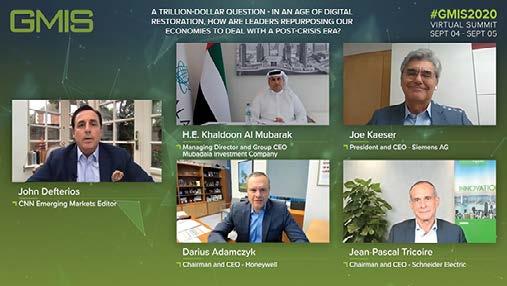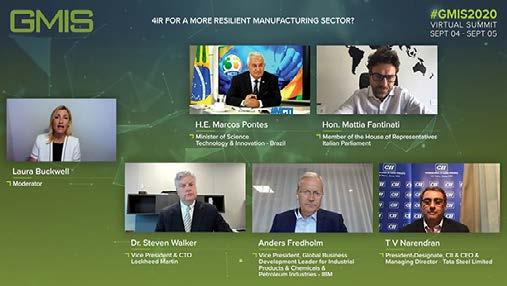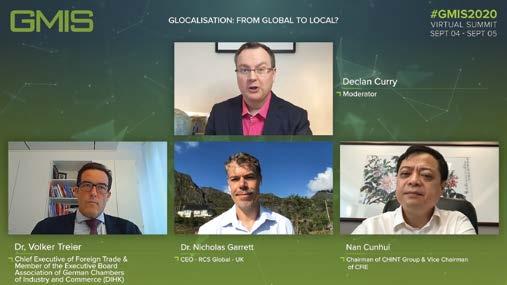
8 minute read
Working Groups
FRIDAY, SEPTEMBER 04, 2020
#GMIS2020 VIRTUAL SUMMIT WORKING GROUPS


GENDER-RESPONSIVE AND INCLUSIVE MANUFACTURING
INCLUSIVE AND SUSTAINABLE INDUSTRIAL PERFORMANCE INDEX

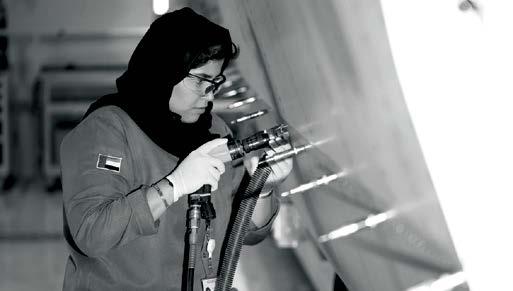
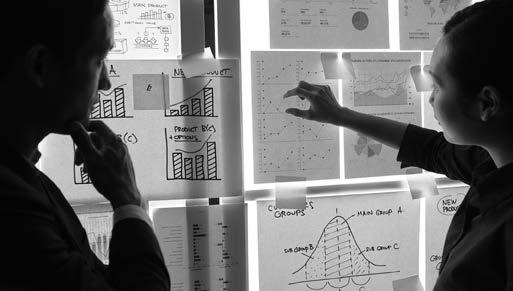
DAY ONE: GMIS Leadership Programme
GMIS gathered a cross-section of experts from leading global organisations to develop a Leadership Programme aimed at shaping future global leaders who prioritise advancing humanity and promoting global prosperity.
By adopting a holistic, human-centric approach using experiential training at a work placement, the programme will combine cultural, technological, and change management experiences with a journey of transformational human development and sustainability experiences. Participants in the working group included Sama Mbang, Head of Digitalisation and Simulation of Manufacturing Load Cases, Daimler; Chris Moehle, Managing Director, The Robotics Hub; and Bernard Meyerson, Chief Innovation Officer Emeritus, IBM.

“More and more companies are gradually giving due weight to addressing the world’s biggest challenges, but to accelerate this process we need education programmes which are inclusive, global in outlook, and bridge the gaps between academia and industry,” said Meyerson. “The GMIS Leadership Programme can help to create future leaders equipped with the skills needed to take on these tough challenges by harnessing the most advanced technologies.”
Action Points
There is a need to increase understanding amongst future industry leaders about the importance of their role in society. The working group recommends seeking means to equip ourselves and future industrialists in leading safely and responsibly.
Knowledge transfer and sharing is much more impactful if an experimental approach is taken, through experiential processes and through convergence of education, bringing together different disciplines.
The working group will aim to create mechanisms to help build alumni networks centered around a 4IR curriculum that will foster knowledge sharing, innovation and implementation.
Participants in the working group included:
SAMA MBANG
Head of Digitalization & Simulation of Manufacturing Load Cases, Daimler
RUTH BOUMPHREY
Director of Research, Lloyd’s Register Foundation (LRF)
HUSSEIN MURAD
CEO, Inspiratus Group and Eupepsia
SRDJAN SUSIC
Director of Conservation, Emirates Nature-WWF
KEITH JEFFREY
Founder, BreakThrough Coaching & Consulting
CHRIS MOEHLE
Managing Director, The Robotics Hub
TSUNG PING CHUNG
Chief of the Strategic Planning and Coordination Division at UNIDO
BERNARD MEYERSON
Chief Innovation Officer Emeritus, IBM
DAVID LEAL-AYALA
Principal Policy Consultant – Manufacturing Technology & Innovation Policy at Policy Links, Institute for Manufacturing, University of Cambridge
BRIAN VIDIC
Director of Partnerships, Office of Economic Partnerships, University of Pittsburgh
GMIS created a working group to help drive and develop the Global Initiative for Future Industrial Safety, which is aimed at ensuring the safety of workers and the public as manufacturers adopt emerging Fourth Industrial Revolution technologies. The initiative, a partnership between Lloyd’s Register Foundation, the United Nations Industrial Development Organization (UNIDO) and the Global Manufacturing and Industrialisation Summit (GMIS), aims to bridge the gaps between academia, industry, regulators, NGOs and governments.
“Emerging trends in technology such as big data, cloud computing, robotics, and 3D printing, are changing the industrial environment very quickly,” said Professor Richard Clegg, Chief Executive, Lloyd’s Register Foundation. “Governments, regulators, and business leaders must work at a similar pace to ensure these new technologies are adopted safely, and keep workers and the public safe in the future. We are excited to be working in partnership with GMIS and UNIDO to develop a new global programme that will promote safety in the future of industry.”
Action Points
The 4IR has brought to light the need to work on protocols to enhance safety of human workers and the environment globally and help procedures and workers ease into new models of work and collaboration.
The working group aims to actively participate in the formulation of standards and promote knowledge sharing and capacity building, through inter alia open databases of best practice examples and joint international training programmes.
Given the existence of several sub-domains of industrial safety and 4IR, dedicated workstreams will be established to advance the discussion and help build consensus on best available solutions, or develop them when necessary.
IRINA SOKOLOVA
Head of International Relations Department Federal Environmental, Industrial and Nuclear Supervision Service of Russia, Rostechnadzor

Participants in the working group included:
JOAQUIM PINTADO NUNES
Chief of the Labour Administration, Labour Inspection and Occupational Safety and Health Branch, International Labour Organisation (ILO)
EVGENY GONCHAROV
Head Kaspersky Lab ICS CERT
JC SEKAR
CEO, Acuizen Technologies
ROBERT JEFFERSON
Medical Director Occupational Health, International SOS
MICHAEL TOOMA
Managing Partner, Australia Clyde & Co
JANE ZAVALISHINA
CEO and President, Mechanica AI
JOHN MARSHALL
CEO, World Ethical Data Forum
KATE FIELD
Global Head Health, Safety and Wellbeing, British Standards Institution (BSI)
NIKKI MCCULLOUGH
Global Application Engineering and Regulatory Manager,Personal Safety Division, 3M
This GMIS working group is looking at ways to promote a Gender-Responsive and Inclusive Manufacturing sector. Evidence suggests that the developments seen across the manufacturing sector disproportionately benefit men in comparison to women.
However, important strides have recently been made to encourage more women to pursue an education in the science, technology, engineering and mathematics (STEM) fields. It is now critical that these positive developments translate to a more genderdiverse workforce in the manufacturing sector. The virtual working group included Loubna Bouarfa, CEO, OKRA Technologies; Ismail Abdulla, CEO, Strata Manufacturing; and Dr. Alina Sorgner, Assistant Professor of Applied Data Analytics in the Department of Business Administration, John Cabot University.
“In the new digital age, the rapid spread of under-developed AI models has resulted in the fragmentation of our society,” said Bouarfa. “Bias is ramping up, in both the physical and digital world. I am a firm believer in the value of diversity, from the way we build our teams to the way we test our algorithms. All stakeholders in society need to embrace diversity and learn to be comfortable addressing human and algorithmic biases.”
Action Points
To reap the full benefits of the 4IR, targeted gender-responsive actions, policies and investments are essential. However, the lack of current research on the topic underscores the need to initiate the debate for evidence-based policy advice in this field.
The working group resolves to promote evidence-based industrial policies and recommendations for a gender-responsive and inclusive 4IR.
Priority focus areas for an inclusive industrial future include inter alia redressing the gender digital divide, and promoting technology-driven, innovative solutions to systemic barriers faced by women and girls to lead, participate in and benefit from industrial development.
Participants in the working group included:

ISMAIL ABDULLA
CEO, Strata Manufacturing
LOUBNA BOUARFA
CEO, OKRA Technologies
HIROSHI KUNIYOSHI
Deputy Director General, and Managing Director, External Relations and Policy Research, UNIDO
DR. ALINA SORGNER
Assistant Professor of Applied Data Analytics in the Department of Business Administration, John Cabot University
PROFESSOR SIRIN TEKINAY
Dean of Engineering, American University of Sharjah
Experts from world-leading organisations came together in this GMIS working group to help drive and develop a new Inclusive and Sustainable Industrial Performance Index that will help measure the Environmental, Social, and Corporate Governance (ESG) performance of public and private sector entities.
A virtual meeting of the working group focused on the need and opportunity to develop an index which would successfully integrate the economic, environmental, social and governance dimensions of industrial development and the manufacturing sector, and which would take into account considerations pertaining to 4IR and impact investment.
Moderating the session, Fernando Cantu Bazaldua, Chief Statistician, UNIDO, said: “The Fourth Industrial Revolution cannot function without high quality data, statistics and knowledge products, as these are fundamental for evidencebased policymaking and monitoring inclusive and sustainable industrial development.” Participants in the working group included Valentin Todorov, Senior Manager, UNIDO, Kate Field, Global Head Health, Safety and Wellbeing British Standards Institution (BSI), Nathan Fabien, Chief Responsible Investment Officer, UN Principles for Responsible Investments (UNPRI) and Maria del Sorbo, Monitoring, Indicators & Impact Evaluation Unit, Joint Research Center (JRC) of the European Commission.
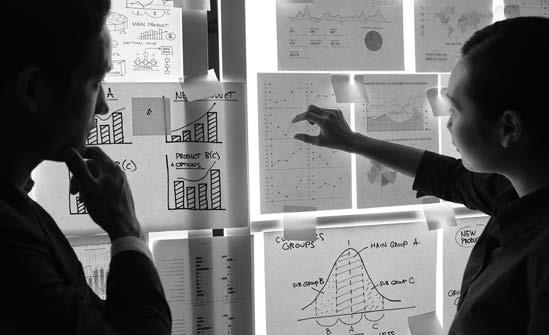
“Advanced innovation is underpinned by data,” said Del Sorbo. “For an inclusive and sustainable future of manufacturing, we must ensure that digital industries are built on reliable, comparable, robust and disaggregated data.”
Action Points
The working group recognises the need to design and develop a new index to measure ISID that reflects all its complexities and that is useful to monitor performance and guide policymakers, firms and practitioners.
The ISID index should provide a general framework that allows firm-level and country-level measurements to be aligned and contribute to monitoring ISID. It should offer hard evidence to set up baselines, measure progress, promote impact investment and identify best policies.
UNIDO, as the custodian of the SDG 9 indicators on ISID, and GMIS are committed to provide support throughout the inception phase of the working group to mobilise resources and ensure the engagement of support partners and experts from different domains.
Participants in the working group included:
FERNANDO CANTU BAZALDUA
Chief Statistician, UNIDO
SORIN COHN-SFETCU
ISO 56008 Project Leader for Innovation Measurements, International Organization for Standardization (ISO)
RENE KAMP
Professorial fellow at UNU-MERIT and Professor of Innovation and Sustainable Development at ICIS, Maastricht University
VALENTIN TODOROV Senior Manager, UNIDO
NATHAN FABIEN
Chief Responsible Investment Officer, UN Principles for Responsible Investments (UNPRI)
JOSE PINEDA
Senior Researcher, United Nations Development Programme (UNDP)
KATE FIELD
Global Head Health, Safety and Wellbeing British Standards Institution (BSI)
MARIA DEL SORBO
Monitoring, Indicators & Impact Evaluation Unit, Joint Research Center (JRC) of the European Commission
JOHN MARSHALL
CEO, World Ethical Data Forum
RAKESH AQARWAL
Chief Risk officer & Accounting Expert, Reliance Industries Ltd
SATURDAY, SEPTEMBER 05, 2020
#GMIS2020 VIRTUAL SUMMIT DAY TWO
